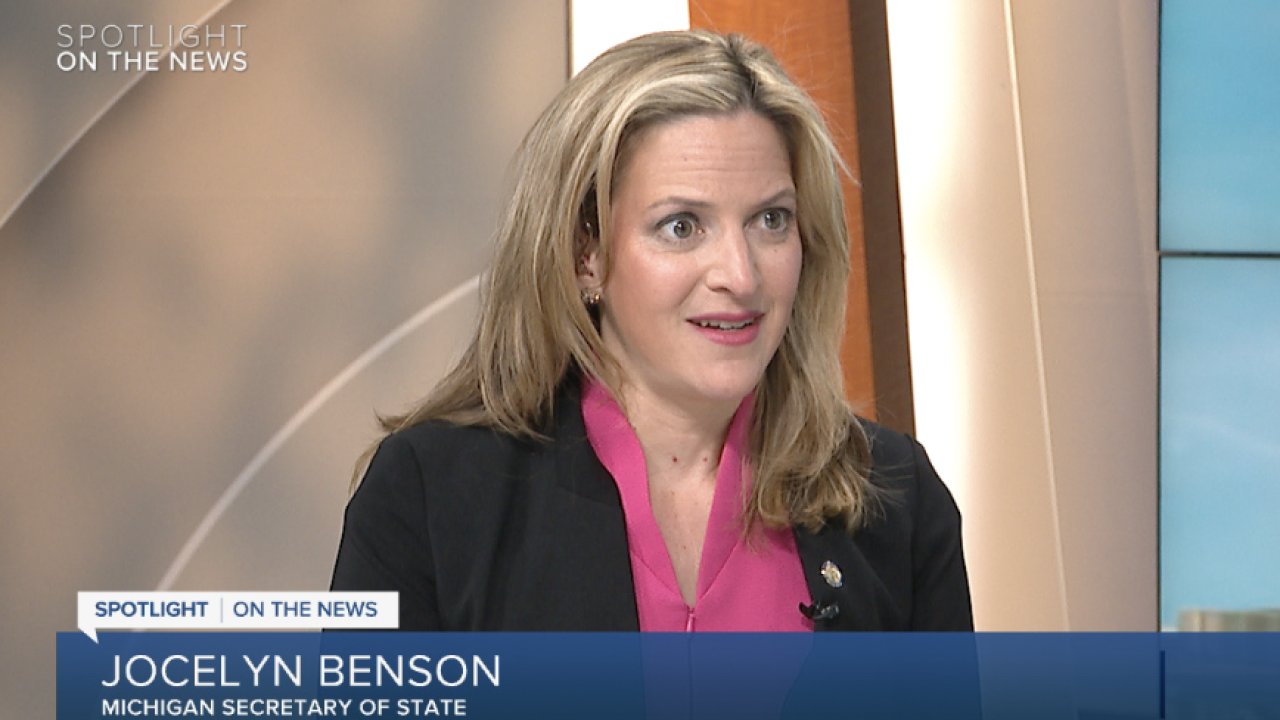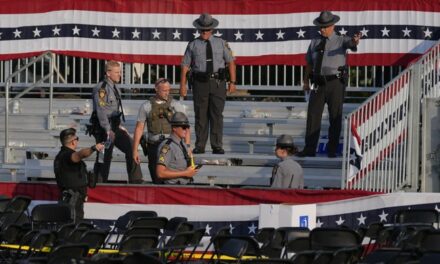We support our Publishers and Content Creators. You can view this story on their website by CLICKING HERE.

Another court case involving Michigan election law, and another loss for Michigan Secretary of State Jocelyn Benson.
This time, the Michigan Court of Appeals is forcing Benson remove the name of Robert F. Kennedy, Jr., from this November’s presidential election ballot. Kennedy abandoned his Natural Law Party presidential run late last month and threw his support behind former President Donald Trump.
“While the request was made close to the deadline for defendant to give notice of candidates to local election officials, it was not made so late that laches should apply,” the three-judge Court of Appeals panel wrote. According to the Detroit News, the judges were “referring to a legal doctrine that lets a court deny relief because a claimant delayed making their claim.”
NEW: Michigan Court of Appeals panel grants RFK Jr.’s request to remove his name from the Michigan ballot pic.twitter.com/WHFDweHIS4
— Jonathan Oosting (@jonathanoosting) September 6, 2024
Go Ad-Free, Get Content, Go Premium Today – $1 Trial
The News reported that Benson’s office has yet to determine if they’ll appeal their loss to the state Supreme Court.
The Midwesterner has been chronicling Benson’s court travails for months. Among its findings:
Go Ad-Free, Get Content, Go Premium Today – $1 Trial
Benson attempt to keep independent presidential candidate Cornel West off November’s ballot was denied by the Michigan Court of Claims two weeks ago.
Victory in Michigan! We brought thousands of voices to the table, and the court listened, rejecting the Democrats’ technical challenges. This is a win for democracy and for every person fighting for truth, justice, and love. Onward!#WestAbdullah2024 #Michigan #NotDroppingOut… pic.twitter.com/AyGSWMtlWh
— Cornel West (@CornelWest) August 25, 2024
Benson “misapplied the law,” according to Judge James Robert Redford.
The Republican National Committee Chair Michael Whatley contends Benson is “yet again working to undermine election integrity by secretly instructing officials to disregard and circumvent” absentee voting safeguards, prompting a lawsuit from the RNC.
That litigation centers on instructions to election officials about the “presumed validity” of signatures that echo instructions she offered three years ago that a judge found unlawful. The courts have repeatedly ruled that Benson has exceeded her authority by not following the proper public review process when creating election rules.
Sen. Ruth Johnson, R-Holly, is chair of the Senate Election Committee, and served two terms as Secretary of State from 2011 to 2019. She was opposed in the 2010 election by Benson, whom she defeated by garnering 50.68% of the vote to Benson’s 45.22%. She was also gubernatorial candidate Richard DeVos’ running mate in 2006.
In 2012, Johnson was sued in her capacity as SOS by the ACLU, SEIU, Latin Americans for Social and Economic Justice and others. The plaintiffs succeeded in preventing Johnson from asking voters to prove their U.S. citizenship.
In 2020, Johnson and former Republican Secretary of State Terri Lynn Land successfully sued Benson to stop her plan to allow the counting of ballots received after Election Day.
In 2020, Johnson and former Republican Secretary of State Terri Lynn Land successfully sued Benson to stop her plan to allow the counting of ballots received after Election Day.
Johnson objected to Benson telling county clerks prior to the 2020 election to presume absentee ballot signatures were genuine and should be accepted in there were “any redeeming qualities.” In March 2021, a state Court of Claims judge ruled Benson’s directions “invalid.” Of course, by then, it was too late.
Other litigation against the Secretary of State focuses on Benson’s refusal to rid the state’s voter rolls of the potential for fraud ahead of the 2024 election. Supporters of former President Donald Trump since early 2020 have raised concerns about hundreds of thousands of Michigan voter registrations for folks who are dead, in prison, or otherwise don’t qualify to vote that remain in the system.
Michigan currently has 8.1 million registered voters for a voting age population of 7.9 million, or 102.8% of the number of legal voters, but Benson’s Bureau of Elections has vowed to ensure ineligible voter registrations remain in the system as long as legally permissible under federal regulations.
Benson’s office also backed bills that Senate Legislative Analyist Abby Schneider said “would hinder the ability of candidates aggrieved by fraud to request recounts, reducing the trust in the election process.”
Additionally, the Michigan Supreme Court will soon determine whether Benson circumvented the rule making process to impose restrictions on poll challengers.
The case argued before the state’s highest court is only the latest in a string of lawsuits over election rules Benson imposed through a manual issued to clerks in 2022 that has since led to repeated defeats in lower courts.
Arguments centered on instructions for election challengers, which involve a uniform credential form, limits on recordings, and a ban on electronic devices during absentee vote counting, The Detroit News reported.
State and national Republican parties are challenging the rules that did not go through the Legislature’s bipartisan Joint Committee on Administrative Rules as required, arguing they violate state election laws.
“Absent compliance with that process, the rules are invalid,” Republican attorney Robert Avers told the court, according to WEMU. “That’s exactly what happened here.”
Republicans filed the case in October 2022, and the Court of Claims sided with them in October 2022, but the Supreme Court suspended the ruling for the 2022 election a month away. The Court of Appeals upheld the Court of Claims ruling last October, sending the case back to the Supreme Court.
“Both of the lower court decisions, the legal maxims discussed by those courts — they’re clear and uncontroversial,” Avers said.
The bills eliminate the current ability of bipartisan elections boards to investigate fraud during recounts, which Schneider said “would prevent bad actors from being held accountable and erode confidence in the State’s election process.”

 Conservative
Conservative  Search
Search Trending
Trending Current News
Current News 





